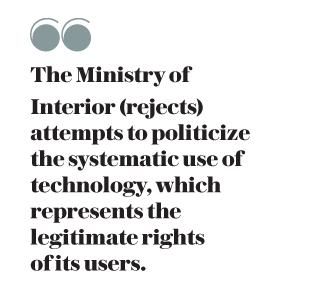JEDDAH: Absher, the “one-click” e-services app launched by the Interior Ministry in 2015, is now regarded as the leading government platform for Saudi citizens, freeing them from bureaucratic inefficiency and endless queuing for everyday services.
However, in a recent New York Times article, the app was criticized as a “tool of repression” following claims by Democratic Senator Ron Wyden and women’s rights groups.
Apple and Google were urged to remove the application from their devices over claims that it “enables abhorrent surveillance and control of women.”
In an official statement, the ministry rejected the allegations and said the Absher platform centralized more than 160 different services for all members of society, including women, the elderly and people with special needs.
The app makes electronic government services available for beneficiaries to access directly at any time and from any place in the Kingdom, the ministry said.
Absher allows residents of the Kingdom to make appointments, renew IDs, passports, driver’s licenses, car registration and other services with one click.
Many Saudis still recall having to queue at government agencies, such as passport control offices and civil affairs departments, for a variety of official procedures. Appointments could take weeks to arrange, with people relying on their green files, or “malaf allagi” — the 1980s and 1990s paper form of Absher that was known as the citizen’s “lifeline,” both figuratively and literally.
Hours would be spent as government departments ferried files back and forth, and if a form was lost, the whole transaction process would have to start again. As complicated as it was for men, women suffered more.
Muna Abu Sulayman, an award-winning strategy adviser and media personality, told Arab News the introduction of Absher had helped strengthen women’s rights.
Sulayman said she was disappointed at comments on the e-services platform being made abroad. “There are consequences that people don’t understand. It’s a very idealistic and naive way of understanding what is going on,” she said.
“The discussion on the guardianship law is internal and ongoing — it is something that has to be decided by our society and not as a result of outside pressure. We’re making strides toward equality and Absher is a step in the right direction,” she said.
“In a Twitter survey, I asked how many women have access to their guardian’s Absher. Most answered that they control their own fate. Men who don’t believe in controlling women gave them access to their Absher and that shows an increase in the participation of women in their own decision-making.”
Absher also provides services such as e-forms, dealing with Hajj eligibility, passport control, civil affairs, public services, traffic control, and medical appointments at government hospitals.
The platform is available to all men and women, and removes much of the bureaucracy and time wasting associated with nonautomated administrative systems.
On the issue of granting women travel permits, the law requires a male guardian to grant it through the portal, as well as for men under the age of 21.
Retired King Abdullah University professor Dr. Zainab M. Zain told Arab News: “I always had issues with my passport renewal as well as my children’s as they are both non-Saudi. For years it was risky not to follow up properly at passport control — you never knew what could happen, but now I can renew their permits by paying their fees online through Absher from the comfort of my home in Abu Dhabi.”
Ehsanul Haque, a Pakistani engineer who has lived in the Kingdom for more than 30 years, said: “Absher has helped tremendously with requests, such as exit and entry visas for my family and myself. I can receive approval within an hour whereas once it would’ve taken me days,” he said.
“The platform has eased many of my troubles.”
The Absher website also provides information on how to report wanted persons, or administrative or financial corruption.
In April, 2018, the ministry launched “Absher Business,” a technical initiative to transfer its business services to an interactive digital system.
With an annual fee of SR2,000 ($533), business owners such as Marwan Bukhary, owner of Gold Sushi Club Restaurant in Jeddah, used the portal to help manage his workers’ needs in his expanding business.
“There are many features in Absher that helps both individual and establishment owners,” he said. “I took advantage of the great features it provided, and it saved me a lot of time and trouble and also my restaurant workers. It’s a dramatic change. When Absher Business was launched last year, it organized how I needed to manage my workers’ work permits.
“Through the system, I could see the status of all my employees, renew their permits, grant their exit and entry visas, and have their permits delivered to my house or my business through the post after paying the fees. It saved business owners a lot of time and energy.
“I used to have to do everything manually myself or have my courier help. I believe it’s the government’s most advanced system yet with more features being added every now and then,” Bukhary said.
“Absher has eased our burden, unlike the old days when we needed to visit government offices and it would take four weeks just to get an appointment. One click is all it takes now.”
How ‘Absher’ app liberates Saudis from government bureaucracy
How ‘Absher’ app liberates Saudis from government bureaucracy

- Western media mistaken in portraying app as a tool of repression, leading female journalist says
UAE FM Sheikh Abdullah arrives in Riyadh to attend Syria meeting

- Welcomed at King Khalid International Airport by Saudi Deputy FM Waleed Al-Khuraiji
RIYADH: Sheikh Abdullah bin Zayed Al-Nahyan, the UAE Deputy Prime Minister and Minister of Foreign Affairs, arrived in Riyadh on Saturday, the Saudi Press Agency reported.
He was welcomed at King Khalid International Airport by Saudi Deputy Foreign Minister Waleed Al-Khuraiji.
Sheikh Abdullah is in the Kingdom to attend an expanded ministerial meeting on Syria to be hosted by Saudi Arabia on Sunday, SPA added.
Saudi Arabia condemns attack on Chad’s presidential palace

- The attack, which occurred on Wednesday, involved gunmen attempting to storm the palace
RIYADH: Saudi Arabia on Saturday strongly condemned the recent attack on the presidential palace in N’Djamena, Chad, which left 19 people dead, including a soldier guarding the complex, and injured others.
The Ministry of Foreign Affairs issued a statement reaffirming Saudi Arabia’s steadfast support for Chad’s security and stability, while rejecting any actions that threaten the country’s peace, the Saudi Press Agency reported.
In its statement, the Ministry extended heartfelt condolences to the family of the fallen soldier and to the government and people of Chad. The Kingdom also wished a swift recovery for those injured in the assault.
The attack, which occurred on Wednesday, involved gunmen reportedly linked to Boko Haram attempting to storm the presidential palace, prompting a fierce battle.
The Chadian government confirmed that 18 attackers from a 24-member commando unit were killed in the fighting, alongside one security personnel. Tanks were deployed to secure the area.
GCC secretary general receives New Zealand’s ambassador to Saudi Arabia

- Al-Budaiwi congratulated Kingston on his appointment as New Zealand’s ambassador to Saudi Arabia, wishing him success in his duties
RIYADH: Secretary-General of the Gulf Cooperation Council Jasem Al-Budaiwi recently received New Zealand’s Ambassador to the Kingdom Charles Kingston at the General Secretariat’s headquarters in Riyadh.
Al-Budaiwi congratulated Kingston on his appointment as New Zealand’s ambassador to Saudi Arabia, wishing him success in his duties, the General Secretariat wrote in a report.
During the meeting, they also discussed a number of topics of mutual interest, notably the progress of negotiations for the free trade agreement between the GCC countries and updates on the joint action plan between the two sides. They also exchanged views on several regional and international issues.
Saudi authority issues health warning on food import

RIYADH: The Saudi Food and Drug Authority issued a warning about Country Butcher Boy beef pepperoni, manufactured in the UAE.
According to the Saudi Press Agency, the 250-gram packages with an expiration date of March 1, 2025, are contaminated with Listeria monocytogenes, a bacterium posing serious health risks, confirmed by lab tests.
The authority advised the public to avoid consuming the product and dispose of any units they may have.

Steps have been taken to remove the contaminated product from the market, and regulatory action is being pursued against the importing company, the SPA reported.
Violations of food laws can result in severe penalties, including up to 10 years in prison, fines of up to SR10 million ($2.6 million), or both.
The authority reiterated its commitment to food safety and will continue taking action against violators. Consumers can report food safety concerns to the authority’s call center at 19999.
Thai Embassy joins Riyadh greening initiative

RIYADH: The Royal Thai Embassy recently took part in a volunteer initiative at Aba Samri National Park in the Murat governorate of Riyadh region, in collaboration with the National Center for Vegetation Cover Development and Combating Desertification.
Part of the National Greening Season, the activity aims to enhance vegetation, curb land degradation, and plant native and adaptive species, supporting the Saudi Green Initiative, the Saudi Press Agency reported.
The embassy’s involvement promotes vegetation restoration and aligns with the center’s call for broader environmental engagement from all sectors. The scheme improves air quality, reduces dust storms and restores ecosystems, the SPA added.
The National Greening Season, a core element of the broader program, fosters public-private partnerships, volunteerism, and awareness about afforestation and combating desertification.
The center leads efforts to protect and restore vegetation sites across Saudi Arabia, addressing challenges such as wildfires, illegal logging and unregulated grazing to safeguard natural ecosystems.





















